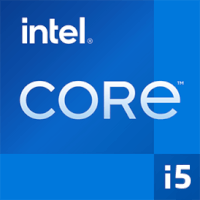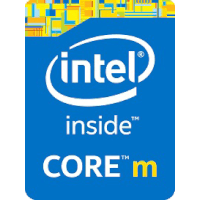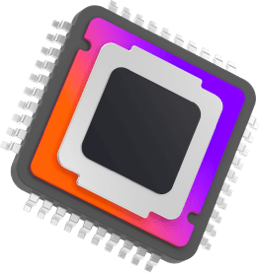| Intel Core i5-4278U | Intel Core m3-6Y30 | |
| 28 W | Max TDP | 4.5 W |
| NA | Consumo de energia por dia (kWh) | NA |
| NA | Custo de funcionamento por dia | NA |
| NA | Consumo de energia por ano (kWh) | NA |
| NA | Custo de funcionamento por ano | NA |
Intel Core i5-4278U vs Intel Core m3-6Y30

O Intel Core i5-4278U opera com 2 núcleos e 4 threads de CPU. É executado em 3.10 GHz base No turbo todos os núcleos enquanto o TDP está definido em 28 W .O processador está conectado ao soquete da CPU BGA 1168 Esta versão inclui 3.00 MB de cache L3 em um chip, suporta canais de 2 DDR3L-1333 SO-DIMMDDR3L-1600 SO-DIMMLPDDR3-1333LPDDR3-1600 e recursos 2.0 PCIe Gen 12 lanes. Tjunction mantém abaixo de -- graus C. Em particular, Haswell U Arquitetura é aprimorada com 22 nm e suporta VT-x, VT-x EPT, VT-d . O produto foi lançado em Q3/2014

O Intel Core m3-6Y30 opera com 2 núcleos e 4 threads de CPU. É executado em 2.20 GHz base 1.80 GHz todos os núcleos enquanto o TDP está definido em 4.5 W .O processador está conectado ao soquete da CPU BGA 1515 Esta versão inclui 4.00 MB de cache L3 em um chip, suporta canais de 2 LPDDR3-1866 e recursos 3.0 PCIe Gen 10 lanes. Tjunction mantém abaixo de -- graus C. Em particular, Skylake Y Arquitetura é aprimorada com 14 nm e suporta VT-x, VT-x EPT, VT-d . O produto foi lançado em Q3/2015
Intel Core i5-4278U
Intel Core m3-6Y30
Detalhes de comparação
| 2.60 GHz | Frequência | 0.90 GHz |
| 2 | Núcleos | 2 |
| 3.10 GHz | Turbo (1 núcleo) | 2.20 GHz |
| No turbo | Turbo (todos os núcleos) | 1.80 GHz |
| Hyperthreading | Yes |
|
| Overclocking | No |
|
| normal | Arquitetura Central | normal |
| Intel Iris Graphics 5100 | GPU | Intel HD Graphics 515 |
| 1.10 GHz | GPU (Turbo) | 0.85 GHz |
| 22 nm | Tecnologia | 14 nm |
| 1.10 GHz | GPU (Turbo) | 0.85 GHz |
| 11.1 | Versão DirectX | 12 |
| 3 | Máx. monitores | 3 |
| DDR3L-1333 SO-DIMMDDR3L-1600 SO-DIMMLPDDR3-1333LPDDR3-1600 | Memória | LPDDR3-1866 |
| 2 | Canais de memória | 2 |
| Memória máxima | ||
| ECC | No |
|
| -- | L2 Cache | -- |
| 3.00 MB | L3 Cache | 4.00 MB |
| 2.0 | Versão PCIe | 3.0 |
| 12 | PCIe lanes | 10 |
| 22 nm | Tecnologia | 14 nm |
| BGA 1168 | Soquete | BGA 1515 |
| 28 W | TDP | 4.5 W |
| VT-x, VT-x EPT, VT-d | Virtualização | VT-x, VT-x EPT, VT-d |
| Q3/2014 | Data de lançamento | Q3/2015 |
Cinebench R20 (Single-Core)
O Cinebench R20 é o sucessor do Cinebench R15 e também é baseado no Cinema 4 Suite. Cinema 4 é um software usado mundialmente para criar formas 3D. O teste de núcleo único usa apenas um núcleo de CPU, a quantidade de núcleos ou capacidade de hyperthreading não conta.
Cinebench R20 (Multi-Core)
O Cinebench R20 é o sucessor do Cinebench R15 e também é baseado no Cinema 4 Suite. Cinema 4 é um software usado mundialmente para criar formas 3D. O teste multi-core envolve todos os núcleos da CPU e tira uma grande vantagem do hyperthreading.
Cinebench R15 (Single-Core)
O Cinebench R15 é o sucessor do Cinebench 11.5 e também é baseado no Cinema 4 Suite. Cinema 4 é um software usado mundialmente para criar formas 3D. O teste de núcleo único usa apenas um núcleo de CPU, a quantidade de núcleos ou capacidade de hyperthreading não conta.
Cinebench R15 (Multi-Core)
O Cinebench R15 é o sucessor do Cinebench 11.5 e também é baseado no Cinema 4 Suite. Cinema 4 é um software usado mundialmente para criar formas 3D. O teste multi-core envolve todos os núcleos da CPU e tira uma grande vantagem do hyperthreading.
Geekbench 5, 64bit (Single-Core)
Geekbench 5 é um benchmark de plataforma cruzada que usa muito a memória do sistema. Uma memória rápida empurra muito o resultado. O teste de núcleo único usa apenas um núcleo de CPU, a quantidade de núcleos ou capacidade de hyperthreading não conta.
Geekbench 5, 64bit (Multi-Core)
Geekbench 5 é um benchmark de plataforma cruzada que usa muito a memória do sistema. Uma memória rápida empurra muito o resultado. O teste multi-core envolve todos os núcleos da CPU e tira uma grande vantagem do hyperthreading.
iGPU - FP32 Performance (Single-precision GFLOPS)
O desempenho teórico de computação da unidade gráfica interna do processador com precisão simples (32 bits) em GFLOPS. GFLOPS indica quantos bilhões de operações de ponto flutuante o iGPU pode realizar por segundo.
Geekbench 3, 64bit (Single-Core)
Geekbench 3 é um benchmark de plataforma cruzada que usa muito a memória do sistema. Uma memória rápida empurra muito o resultado. O teste de núcleo único usa apenas um núcleo de CPU, a quantidade de núcleos ou capacidade de hyperthreading não conta.
Geekbench 3, 64bit (Multi-Core)
Geekbench 3 é um benchmark de plataforma cruzada que usa muito a memória do sistema. Uma memória rápida empurra muito o resultado. O teste multi-core envolve todos os núcleos da CPU e tira uma grande vantagem do hyperthreading.
Cinebench R11.5, 64bit (Single-Core)
O Cinebench 11.5 é baseado no Cinema 4D Suite, um software popular para gerar formulários e outras coisas em 3D. O teste de núcleo único usa apenas um núcleo de CPU, a quantidade de núcleos ou capacidade de hyperthreading não conta.
Cinebench R11.5, 64bit (Multi-Core)
O Cinebench 11.5 é baseado no Cinema 4D Suite, um software popular para gerar formulários e outras coisas em 3D. O teste multi-core envolve todos os núcleos da CPU e tira uma grande vantagem do hyperthreading.
Cinebench R11.5, 64bit (iGPU, OpenGL)
O Cinebench 11.5 é baseado no Cinema 4D Suite, um software popular para gerar formulários e outras coisas em 3D. O teste iGPU usa a unidade gráfica interna da CPU para executar comandos OpenGL.
Estimated results for PassMark CPU Mark
Alguns dos CPUs listados abaixo foram testados por CPU-Comparison. No entanto, a maioria das CPUs não foi testada e os resultados foram estimados por uma fórmula proprietária secreta de CPU-Comparison. Como tal, eles não refletem com precisão os valores reais da marca Passmark CPU e não são endossados pela PassMark Software Pty Ltd.

Estimativa de uso elétrico


